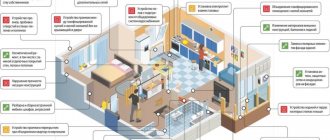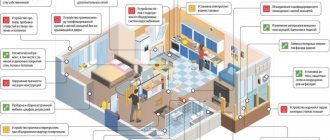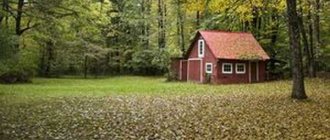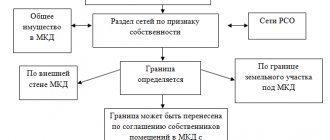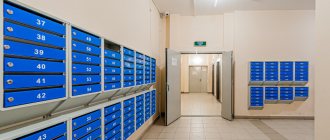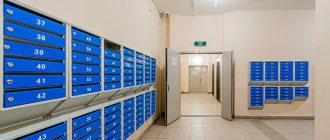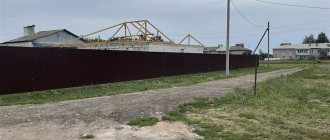What does each owner own in apartment buildings?
In residential buildings, in addition to apartments, there may be premises intended for offices, shops, hairdressers, etc. All other property in the house is common, that is, a share in it belongs to each owner . Signs of such property:
- allows you to serve several rooms;
- does not belong by right of ownership to one person;
- is not a hallway, attic, or other part of the apartment.
Common property can be located inside an office or store, for example, cold and hot water supply risers.
An approximate list of property, a share in which belongs to all owners in the house , is called Art. 36 Housing Code of the Russian Federation:
- Auxiliary premises for shared use - landings, attics, elevators, basements.
- Shared premises for social and domestic purposes - fitness rooms, laundries, etc.
- Roofs, engineering equipment.
- The adjacent territory and the objects located on it.
Property is considered joint ownership regardless of how many people actually use it.
What is common property and common areas in apartment buildings?
The composition of an apartment building (MKD) includes residential and non-residential premises , as well as common use (POP). The owners of non-residential buildings may be local government bodies, individuals or legal entities who have the same rights and obligations as the owners of residential buildings.
POP refers to areas located outside residential or non-residential premises and intended to serve the owners. As a generalization, the concept of common property of apartment buildings is used, which, in addition to POP, includes structures and systems designed to serve several premises, and the adjacent land plot.
The procedure for determining and the right of owners to it is regulated by Art. 289 and 290 of the Civil Code of the Russian Federation.
The register includes:
- POP : stairs and landings, elevators and elevator shafts, corridors, terraces and galleries, attic, basement, technical and service rooms.
- Structures : foundation, roof, load-bearing walls, interfloor and floor coverings, columns, windows and doors in the POP, railings and parapets.
- Engineering systems : plumbing, electrical, gas, heating, plumbing and other equipment located outdoors. General equipment includes indoor equipment, but intended to serve several owners.
- Adjacent territory : the area on which the building is located, lands for landscaping and landscaping, as well as equipment and structures located on them.
The classification and content rules were approved by Decree of the Government of the Russian Federation of August 13, 2006 No. 491.
Who is the owner of the adjacent territory?
The territory around a non-residential building in urban planning legislation is called adjacent (GrK RF, art. 1, clause 37). The term “house area” of a building is used in the housing sector. This is a public area - streets, sidewalks, vacant lots within the municipality.
They are the property of municipalities. The adjacent territory does not belong to the owners of the buildings, but the responsibility for its maintenance is assigned to them by law (Part 9 of Article 55.25 of the Civil Code of the Russian Federation). Owners may delegate such responsibilities to tenants, other legal owners, and management companies.
The obligation of the building owner to carry out improvement of the adjacent territory has been established since June 28, 2021, Federal Law No. 463 of December 29, 2021.
Previously, the courts proceeded from the fact that municipal improvement rules cannot oblige property owners to maintain land plots belonging to municipalities, that is, adjacent territories. Now this practice is not applicable - the obligation is established by federal law.
Who owns the public areas in the building?
Places in a non-residential building that are not used independently and allow the service of more than one room are auxiliary. They provide passage between the main premises, exit outside the building, and operation of utilities. Public areas (PPA) are :
- corridors;
- lobbies;
- internal and fire escapes;
- elevators;
- mines, etc.
The question of ownership of the MOP arises if there are several premises in one building. This situation is typical for office and shopping centers, warehouse areas, etc. The status of MOP is definitely not spelled out anywhere in the law.
However, judicial practice has been formed on this issue (see Resolution of the Plenum of the Supreme Arbitration Court No. 64, dated July 23, 2009). MOP is common property in a building , and the right to it belongs to all owners of the premises. Each of them has a share in the right of common ownership.
In practice, situations are possible when a record is made in the Unified State Register that the MOP in the building belongs to only one of the owners. In this case, it is necessary to apply to the court with a demand for recognition of the right to a share in the common property. The registry entry will be corrected.
What is the status of common property?
In addition to auxiliary premises, the non-residential building has:
- bearing structures;
- roof;
- foundation;
- pipes;
- elevators;
- railings, etc.
Regardless of location, such objects are classified as joint ownership if they are intended to serve more than one premises . The legal status of such property is similar to the status provided for by housing legislation.
The share in the right of common ownership is calculated depending on the area of the premises owned by the owner, and in rare cases - on their volume. When selling or inheriting premises, the share in the right to the common property also passes. The right to such property arises by force of law, it is unconditional and cannot be alienated separately from the main property.
Basic Concepts
Shared spaces are those spaces and rooms that are necessary to serve multiple spaces. Also considered such objects are corridors, staircases and other areas of the building through which passages to various rooms are made. Such objects in a non-residential building are considered to be:
- facilities that are used to service more than one premises;
- staircases and the stairs themselves;
- halls;
- elevators;
- technical floors;
- corridors;
- roof;
- basements;
- engineering Communication.
Contents order
The owners of the premises have the right to establish the regime for the use of the common property of the building, as well as the adjacent territory, at a meeting. You should act in accordance with the Housing Code of the Russian Federation (Article 44–) and the Civil Code of the Russian Federation (Chapter 9.1).
The meeting of co-owners can be held in person, in absentia or in a mixed form and must be recorded. At least half of all participants must be present, and the decision is made by a simple majority of votes.
The list of activities for maintaining the adjacent territory must comply with municipal landscaping rules. They indicate the rules and procedure for the participation in such events of persons authorized to be responsible for the operation of the building (GrK RF, art. 55.25, part 9).
Owner's responsibilities
Civil legislation provides that the owner’s responsibilities for the maintenance of common property are financial in nature (Civil Code of the Russian Federation, Art. 249). However, by agreement among themselves, co-owners can also provide for a different format of participation - for example, cleaning the territory, participating in cleanup days.
- MOP must be maintained properly, that is, in compliance with SanPiNs, GOSTs, in a safe condition.
- Stairs, elevators, corridors must allow free use of the building and its parts.
- Engineering communications and metering devices must be in a state of readiness and operability.
- The external appearance of the building is consistent with the architectural design.
The rules for maintaining common property in an apartment building are determined by the Government of the Russian Federation (Resolution No. 491 of August 13, 2006).
What does the management organization do to manage the assets of this fund?
The main purpose of property management is to ensure the efficient use of property and ensure the execution of the owner's core activities. The management organization must, through its activities, achieve the most profitable uses of real estate.
Her responsibilities include:
- Formation of profitable use of the property. The use of real estate must be expedient and not incur losses for the owner.
- Ensuring communication with the public and local government agencies.
- Creation and implementation of a real estate development plan.
- Analysis of the real estate market and conducting marketing research in order to represent the property on the market.
- Ensuring the correctness of transactions and conclusion of contracts from a legal point of view. Maintain documentation in accordance with established standards.
- Concluding an agreement with cleaning services (read about the agreement and the nuances of cleaning non-residential premises here).
- Ensuring that funds for maintaining the facility are spent appropriately.
- Organization of repair work. Installation of necessary equipment (video cameras, Internet).
- Necessary accounting support.
- Maintaining the initial value of the property or increasing it.
The activities of the management company must be agreed upon with the owner, depending on the functional purpose of the object (Civil Code of the Russian Federation, Art. No. 296).
We talked about the rights and obligations of the owner of non-residential premises here.
Is the owner obligated to pay for common household needs?
The law places the burden of bearing the costs of maintaining and preserving the property on the owner of non-residential premises. The Housing Code of the Russian Federation details that the monthly fee includes :
- fee for maintaining the premises;
- contributions for major repairs (you can find out who should pay for major repairs of non-residential premises here).
Payment for services for maintaining the premises in proper condition includes payment for the maintenance of common property in an apartment building.
You cannot transfer to another person your right to part of the common property of the apartment building, as well as the responsibilities for its maintenance separately from the right to the main premises.
What is it and do you need a license to operate a building?
The transfer of one's property rights and obligations for the purpose of delegating authority to maintain real estate is called operational management. The organization to which the right has been transferred cannot dispose of the property at its own discretion; all actions must be agreed upon with the owner and covered in the contract.
Both an individual and a legal entity may be suitable to perform management functions, since a license for this type of activity is not required (Federal Law No. 99 “On licensing of certain types of activities”).
Should the owner transfer funds for one-room parking and an elevator?
The obligation to participate financially in the maintenance of property belonging to all owners of premises in the building is unconditional and does not depend on what kind of premises is owned - an apartment or an office. It also does not depend on whether such property is actually used.
Owners of beauty salons on the ground floors must pay for the maintenance of the elevator and roof, and apartment owners must pay for the maintenance of corridors on the ground floors intended for office space. In 2021, this position was supported by the Supreme Court of the Russian Federation (Plenum Resolution No. 22 of June 27, 2021).
Payment for the use of common property of an apartment building
Payment for the maintenance of common property by the owner of the real estate is made according to the rules and tariffs established for owners of residential apartments. They are calculated by the management company and adopted at a meeting of residents. The transfer is carried out on the basis of a payment received from the management company for operating expenses , as well as separately for major repairs.
The payment includes the following items:
- costs for lighting POP;
- maintenance of intercoms and special equipment (including an amplifier for a common television antenna);
- heating POP;
- maintaining cleanliness;
- landscaping;
- arrangement and maintenance of children's playgrounds;
- elevator maintenance;
- maintenance of the house boiler room (if any);
- expenses for current repairs.
Read more about what major and current repairs of non-residential premises are, and whether owners should pay for them, in a separate article.
The costs of garbage collection are taken out of operating costs and are paid for as a separate payment. The work schedule and costs for current repairs are established by a meeting of residents annually or once every 3 years.
Accrual of ODN in MKD
The government has determined the procedure for calculating and paying fees for the maintenance of premises in section 6 of the Rules for the provision of utility services. They were approved by Resolution No. 354 of May 6, 2011. General house needs (GDN) include :
- Maintenance of electrical wiring, gas and water pipes located inside the house.
- They may also include organizational costs for working with debtors, taking meter readings, and working with payments.
- Expenses for public housing also include payment for utilities consumed for general needs - lighting, heating of common areas, etc. (read about what is included in utilities for non-residential premises in an apartment building, what are the features of their payment, and from In this article you will learn about how owners can pay for electricity according to tariffs).
The payment scheme depends on the management method in the house . With the most common method - choosing a management company - the payment for the ODN is included in the payment for the maintenance of common property. At the same time, the payment form provides a detailed calculation of the costs of one-way service.
Consumption of communal resources for general house needs and the surrounding area should not exceed the standards established by each subject of the Russian Federation.
Excessive consumption according to ODN must be paid by the management company.
The amount of payment for the use of each utility resource is determined after readings are taken from the common meter, taking into account the area per owner.
Control methods
There are several ways to manage your property:
- The management company assumes the responsibility for maintaining the building in the condition required for use and carries out all necessary repairs on time for the normal functioning of the property. The management company has experience and a professional approach in the field of property management and this is its main advantage. You will find all the features of renovation work of non-residential premises here.
- Creation of a homeowners' association (HOA). The purpose of the organization is to maintain property. The partnership can itself make all decisions regarding the maintenance of common property. A significant disadvantage is the inexperience of property owners in this field of activity.
- Organization of a housing construction cooperative (HBC). The main purpose of the association is construction and property management. All members of the cooperative contribute a share. The advantage of housing cooperatives is the participation of all members of the cooperative in decisions related to real estate (Article 116 of the Civil Code of the Russian Federation).
- If the premises belong to a small number of owners, it is possible to manage them jointly by all owners. In this case, all expenses are divided in equal shares. Owners make their own decisions regarding the maintenance and repair of buildings.
The housing construction cooperative must include at least five citizens or organizations.
How to draw up an agreement for the maintenance of non-residential premises?
To fulfill obligations to maintain his property, the owner of a commercial premises should enter into an agreement with a service organization . It could be:
- A separate agreement for the maintenance, maintenance and repair of non-residential premises (we talked in detail about the maintenance of non-residential premises in an apartment building here).
- The management agreement for an apartment building, which is concluded with the management company and each owner - Art. 162 of the Housing Code of the Russian Federation (read about what operational management of non-residential buildings and premises is, as well as the nuances of concluding a contract, here).
The agreement must be drawn up in writing and signed by the owner of the premises and the organization providing maintenance services.
It should define the following essential points:
- who are the parties to the agreement;
- what relates to the common property of the house (building);
- what are the organization’s responsibilities for maintaining the property - a list of works, services, provided utility resources;
- What are the owner’s responsibilities for making payments - the payment procedure, payment deadlines.
Our specialists have prepared information for you about the rules for the use and ownership of non-residential real estate. In particular, read about how to:
- connect to the Internet while complying with the law;
- correctly draw up an agreement with the cleaner;
- act in case of flooding.
What you can, should and are responsible for as the owner of non-residential premises
Lawyer Antonov A.P.
You have the right to own, use and dispose of your premises. Your main responsibility is to maintain it, in particular pay for utilities, and ensure its safe condition. If you fail to do this, you may be subject to administrative or civil liability. For example, they will recover damages caused to neighbors if you caused a fire in the premises. The specific list of rights and obligations depends on where your premises are located - in an apartment building or a non-residential building. For example, in an apartment building you do not need to pay tax on the land under the house.
1. Rights of the owner of non-residential premises Like every owner, you have the rights to own, use and dispose of property (clause 1 of Article 209 of the Civil Code of the Russian Federation). You also have the right to receive a payment if the land plot under the building in which your premises is located is seized for state or municipal needs (Decision of the Supreme Court of the Russian Federation dated November 20, 2018 in case No. 309-KG18-13252, A50-28633/2017). In addition, the scope of your rights depends, among other things, on where your non-residential premises are located - in an apartment building or a non-residential building. If the premises are located in an apartment building, you have most of the rights and obligations that the owners of apartments in this building have. You can, for example: use the common property of an apartment building: corridors, elevators, etc. (Parts 1, 2 of Article 36 of the RF Housing Code). However, you do not have the right to use it alone without the consent of other co-owners. For example, placing personal equipment on the common property of an apartment building (clause 26 of the Review of Judicial Practice of the Supreme Court of the Russian Federation No. 1 (2021)); enjoy the rights of a consumer of utility services. For example, require the contractor to check the quality of the provided utility services (clauses 2, 33 of the Rules for the provision of utility services); participate in general meetings of premises owners. For example, in order to choose a method of managing an apartment building, approve the amounts of certain contributions (Parts 1, 2, Article 44 of the Housing Code of the Russian Federation). If the premises are located in a non-residential building, you have the right, among other things: to buy or rent state or municipal land underneath it without holding an auction (clause 6, clause 2, article 39.3, clause 9, clause 2, article 39.6 of the Land Code of the Russian Federation); use the common property of the building in the same manner as the Civil Code of the Russian Federation establishes for participants in shared ownership and for owners of apartments in an apartment building (clause 1 of the Resolution of the Plenum of the Supreme Arbitration Court of the Russian Federation dated July 23, 2009 N 64).
2. Responsibilities of the owner of non-residential premises You have a common duty for all owners - to bear the burden of maintaining their property (Article 210 of the Civil Code of the Russian Federation). The specific list of responsibilities differs depending on where your premises are located - in an apartment building or in a non-residential building. In an apartment building, you are obliged, in particular: to enter into direct contracts for the supply of utility resources with resource supply organizations (clause 6 of the Rules for the provision of utility services). That is, you cannot pay for utilities to the HOA or management company. If there is no such agreement, the volume of consumption may be determined for you as for unauthorized use (clause 6 of the Rules for the provision of utility services). As a rule, this is much more expensive than if you paid according to metering devices; bear the costs of maintaining common property in an apartment building, in particular, pay contributions for its major repairs (Part 1, Article 39, Part 1, Article 169 of the Housing Code of the Russian Federation). At the same time, there is no need to pay land tax for a land plot that is part of the common property (clause 6, clause 2, article 389 of the Tax Code of the Russian Federation); bring the premises to their previous condition if there was illegal redevelopment (Part 3 of Article 29 of the Housing Code of the Russian Federation).
In a non-residential building, in particular, you are obliged to: pay for utilities (Article 210, paragraph 1, Article 539, Article 548 of the Civil Code of the Russian Federation). Moreover, you must pay for them, even if you have rented out the premises, but the tenant has not entered into an agreement with the resource supply organization (see the Position of the RF Armed Forces); bear the costs of maintaining the common property of the building (Article 249 of the Civil Code of the Russian Federation). In particular, you will have to pay tax or rent for the land plot that is occupied by the building and is necessary for its use (clause 7, clause 1, article 1, clause 1, article 65 of the Land Code of the Russian Federation).
3. Responsibility of the owner of non-residential premises If you do not fulfill or improperly fulfill the duties of the owner of the premises, you may be brought to: 1) administrative liability. In particular, for violation of sanitary and epidemiological requirements for the operation of public premises (Article 6.4 of the Code of Administrative Offenses of the Russian Federation). For example, if you do not carry out daily cleaning in your retail premises (clause 10.1 SP 2.3.6.3668-20); 2) to civil liability. In particular, you may be charged: damages if damage was caused to third parties due to improper maintenance of the premises. For example, neighboring rooms were flooded (Article 15, 1064 of the Civil Code of the Russian Federation); penalties for late payment of utilities. For example, if you fail to pay for water supply on time, you are required to pay a penalty in the amount of 1/130 of the Bank of Russia refinancing rate of the debt amount for each day of delay (clause 30 of the Rules for cold water supply and sanitation). In some situations, criminal liability is possible, but only a sane individual who has reached a certain age can be brought to justice (Article 19 of the Criminal Code of the Russian Federation). For example, the head of an organization, if he systematically provided premises for illegal organization and (or) gambling (Article 171.2 of the Criminal Code of the Russian Federation).
Sincerely, lawyer Anatoly Antonov, managing partner of the law firm Antonov and Partners.
Still have questions for your lawyer?
Ask them right now here, or call us by phone in Moscow +7 (499) 288-34-32 or in Samara +7 (846) 212-99-71 (24 hours a day), or come to our office for a consultation (by pre-registration)!

